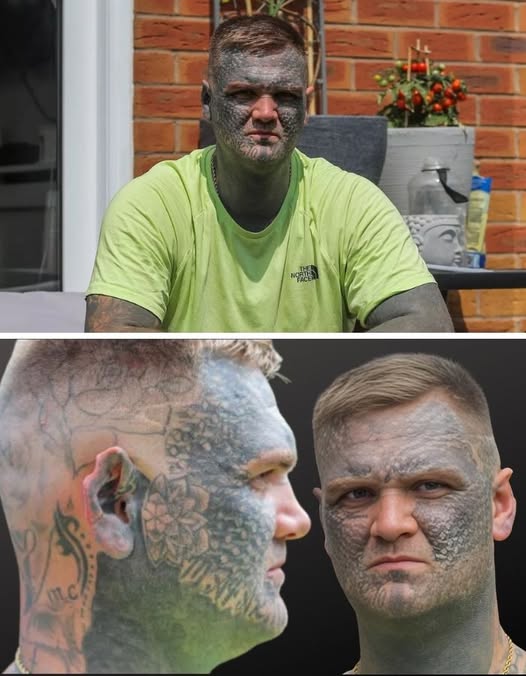For many travelers, Dubai represents the pinnacle of modern luxury, a glittering oasis of skyscrapers, supercars, and spotless beaches. But beneath its polished exterior lies a delicate interplay of culture, image, and control that can catch even seasoned tourists off guard.
So what happens when personal expression collides with invisible cultural lines?
That’s the question 34-year-old Jordan Howman is now grappling with after he was detained, denied entry, and deported all before stepping foot outside Dubai International Airport. His alleged offense? Tattoos. Not any tattoos, but the kind that cover nearly every inch of his face.
Howman’s £3,000 trip with his fiancée and teenage daughter was supposed to be a return to what he called his “favorite country in the world.” Instead, it ended with confusion, humiliation, and an emotional separation from his family raising urgent questions about appearance-based profiling, cultural sensitivity, and the risks tourists might not realize they’re taking.
What Happened to Jordan Howman
Jordan Howman arrived in Dubai on June 11, expecting a luxurious escape with his fiancée, Theresa, and his 16-year-old daughter, Kaic. Having previously visited the United Arab Emirates twice without issue, he anticipated another smooth entry into a country he had grown to love. But this time, things took a turn he hadn’t imagined.

Shortly after stepping off his Emirates flight at Dubai International Airport, Jordan used the automated e-gates to scan his passport. Before he could proceed to baggage claim, he was pulled aside by airport personnel. A staff member questioned whether his passport had been stamped despite the electronic system not requiring a physical stamp and then, according to Howman, abruptly took the passport from his hand.
What followed was hours of confusion and anxiety. Jordan was taken to a waiting room and held for over four hours without clear explanation. Meanwhile, his fiancée and daughter had already made their way to the five-star Anantara hotel, unaware of the unfolding ordeal. When Theresa attempted to return to the airport by taxi to see him, officials allegedly refused to let her through, and she had no choice but to return to the hotel £250 lighter and deeply shaken.
Eventually, Jordan was transferred to the immigration office, where, he claims, officials made it clear that the reason for his denial was his appearance. “You’re not coming in because of your face tattoos you’re not coming in because of the way you look,” he was reportedly told by a female officer. A more senior official confirmed the decision, and without any formal charge or legal explanation, he was ordered to leave the country immediately.
By 2:30 p.m. approximately six hours after landing Jordan was placed on a return flight to Manchester. His passport was returned only after he touched down back in the UK. For the remainder of the trip, he was separated from his daughter and partner, able to connect only through brief FaceTime calls.
“It made me feel like absolute rubbish,” he later said. “I’ve been treated like a criminal just for having tattoos.”
Facial Tattoos and Cultural Boundaries in the UAE
While there is no written law in the United Arab Emirates explicitly banning tattoos facial or otherwise the reality on the ground is shaped by deeply ingrained cultural and religious values that can influence decisions at the discretion of authorities. For tourists like Jordan Howman, this can lead to situations where behavior or appearance deemed acceptable at home may be quietly frowned upon or in some cases, outright rejected.
In Islamic tradition, permanent tattoos are generally considered haram, or religiously forbidden. Many scholars within Islam interpret tattoos as a form of altering God’s creation, and therefore view them as a form of body mutilation. Though these views don’t carry the weight of criminal law for tourists, they contribute to an undercurrent of social conservatism that informs public policy, particularly at immigration checkpoints.
This tension between personal identity and cultural expectations is amplified when tattoos are placed on highly visible parts of the body, especially the face. In the West, face tattoos may still be unconventional, but they’re often accepted as a form of personal expression. In the UAE, however, facial ink can carry very different connotations linked less with artistry and more with criminality, gang affiliation, or defiance of religious norms.
Dubai, while outwardly modern and cosmopolitan, is governed by a conservative legal framework underpinned by Islamic values. That framework allows for broad discretion by immigration officials, especially when it comes to maintaining “public order” or the country’s image. What may seem like discrimination to one person can be interpreted as a subjective security or cultural judgment by authorities.
This puts travelers like Howman in a complicated position. Although his tattoos words like “Blessed,” “Crazy Life,” and “Family,” along with elaborate geometric shapes don’t express hate speech or anything overtly offensive, their prominence may have been enough to raise concern in a country where appearance is often closely tied to social perception.


